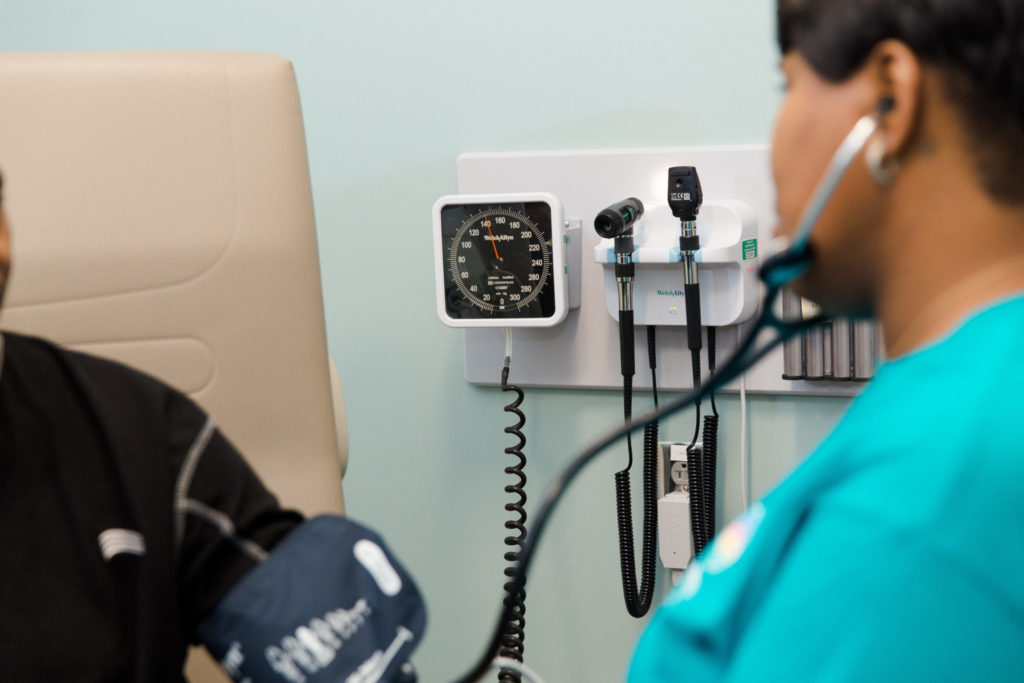At Community Access Network, we’re in the business of treating the whole patient, which is why you’ll find doctors ranging in specialties at our office from gynecology to behavioral health and pediatrics. Treating the whole patient means looking at every aspect of their health, nutrition, sleep, stress and so on so we can make treatment plans or recommendations for a life well lived. When patients come to see us, we always check their blood pressure and that’s on purpose: If you can lower your blood pressure, you can reduce your risk for more long-term issues.
What is Blood Pressure?
We’ve all felt stressed and made the comment, at least once, that our blood pressure is high. Oftentimes blood pressure is equated to stress or anxiety, but the truth is that blood pressure is representative of how the blood is circulating throughout the blood vessels. It considers the actual pressure that is being put on the blood vessel walls.
If too much pressure is being put on the blood vessel walls, individuals could be at risk for coronary artery disease, stroke, heart failure, atrial fibrillation, vision loss and so on. If the pressure on the blood vessel walls is too light, individuals could be at risk of dizziness, weakness, fainting and risk of injury from falls because your blood isn’t able to pump enough oxygen throughout the body in a timely manner.
Normal, healthy adult blood pressure is 120/80.
How to Lower Your Blood Pressure
So how do you find that sweet spot, where your blood pressure is not too high or too low? First, it’s important to consult your doctor. When you go in for any check up, your healthcare team will check your blood pressure and let you know the results.
If it’s too high or too low, talk with them about it and tactics that you could use to improve.
However, there are some ways that you can lower your blood pressure just by making general lifestyle changes.
Walk or exercise regularly
We’re not suggesting that you go from 0 to 100 with exercise, especially if you don’t already have an exercise routine that you’re sticking to. Instead, we recommend incorporating small changes throughout your day that will keep you more active. The reason for this is because exercise naturally makes your heart stronger, which means it will pump blood more efficiently, which lowers the pressure put on your arteries.
Take the stairs rather than the elevator. Walk to the corner convenience store rather than drive, if there are safe sidewalks to walk on. Use your lunch breaks at work to walk around the office building or neighborhood. Look for small ways that you can increase your activity level throughout the day.
If you already have an exercise routine in place, how can you get more out of it? As a general rule, 150 minutes of moderate exercise like walking, or 75 minutes of high energy exercise like running, each week can help lower blood pressure.
Reduce Sodium Intake
It can be challenging to eat healthy, especially eating healthy on a budget. One way to eat healthier and lower your blood pressure all in one is to reduce your sodium intake. Salt impacts blood pressure because the salt will essentially create an imbalance in your bloodstream and the kidney’s ability to remove water. This ultimately puts a strain on your blood vessels that are leading to your kidneys.
On a whole, Americans have too much sodium in their diets, in large part because of the high volume of processed foods we eat.
Cut back on sodium by swapping processed snacks for fruits, vegetables or more all-natural foods. Also, try to cut back on fast foods, which naturally have higher sodium content.
Drink Less Alcohol
Alcohol is linked to 16% of high blood pressure cases around the world. Where in some cases, it has been advised that red wine can have heart healthy benefits, in many cases the high consumption of alcohol can have negative impacts.
The reason for this is that alcohol consumption puts stress on your liver. Any time one of your organs is stressed, your blood is required to pump harder to help try to balance your body back out.
Learn to Manage Stress
Yes, stress is a factor in high blood pressure. Constant stress means your body is always in a fight-or-flight type of mode, which means faster heart rate and overworked blood vessels. So, it’s important to practice self-care and look for ways to reduce stress where possible.
- Listen to soothing music
- Work less
- Focus on social wellness
- Meditate or read
- Reduce screen time
Whatever you’re able to do to manage or reduce the stressors in your life, the better off your blood pressure will be.
Lose Weight
If you’re overweight, losing even 5% of your body mass could dramatically lower your blood pressure. Bodies that are overweight require more pressure to move blood around the body, thereby putting more strain on the heart, blood and blood vessels, which raises blood pressure.
Lose weight by improving diet and incorporating an exercise regimen as listed above.
Consult Your Doctor to Lower Your Blood Pressure
While these changes will positively impact your blood pressure, it’s important to always consult your doctor before making any lifestyle changes. Additionally, your doctor can help you identify other ways to lower your blood pressure as needed, such as medicine, additional screenings and so on. We’re here to help. Stop by Community Access Network or call to schedule an appointment with us.
